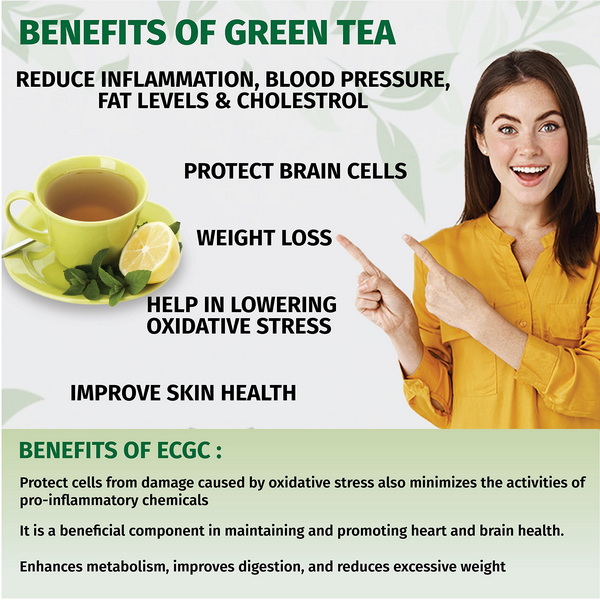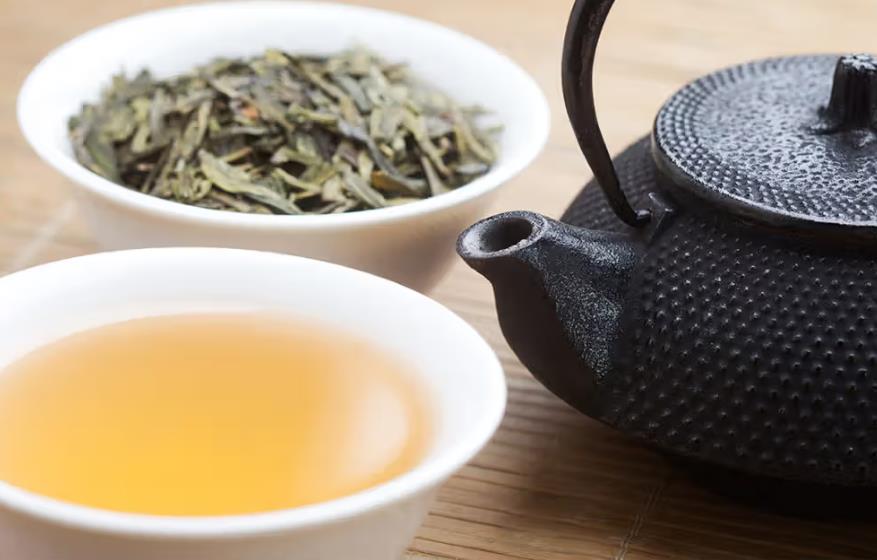Content Menu
● The Power of Green Tea Extract
● Health Benefits of Green Tea Extract
>> Antioxidant Properties
>> Weight Management
>> Heart Health
>> Brain Function
>> Cancer Prevention
>> Liver Protection
● How to Use Green Tea Extract
● Potential Side Effects and Precautions
● The Science Behind Green Tea Extract
● Green Tea Extract vs. Drinking Green Tea
● Green Tea Extract in Skincare
● The Role of Green Tea Extract in Exercise Performance
● Green Tea Extract and Oral Health
● The Future of Green Tea Extract Research
● Conclusion
● Frequently Asked Questions
>> 1. How much green tea extract should I take daily?
>> 2. Can green tea extract help with acne?
>> 3. Is it safe to take green tea extract while pregnant?
>> 4. Can green tea extract interact with medications?
>> 5. How long does it take to see results from taking green tea extract?
● Citations:
Green tea extract has gained significant popularity in recent years due to its potential health benefits. This concentrated form of green tea is packed with powerful compounds that can have a wide range of effects on the human body. In this comprehensive article, we'll explore the various ways green tea extract can impact your health and well-being.

The Power of Green Tea Extract
Green tea extract is derived from the leaves of the Camellia sinensis plant, the same plant used to make green tea. However, the extract is a more concentrated form, containing higher levels of beneficial compounds, particularly catechins. The most abundant and well-studied catechin in green tea extract is epigallocatechin gallate (EGCG).
Health Benefits of Green Tea Extract
Antioxidant Properties
One of the most significant benefits of green tea extract is its potent antioxidant properties. Antioxidants help protect our cells from damage caused by free radicals, which are unstable molecules that can lead to oxidative stress and contribute to various diseases.
The catechins in green tea extract, especially EGCG, have been shown to be powerful antioxidants. They can neutralize harmful free radicals and may help reduce the risk of chronic diseases associated with oxidative stress.
Weight Management
Green tea extract has been widely studied for its potential effects on weight loss and metabolism. The combination of caffeine and catechins in green tea extract may help boost metabolism and increase fat burning.
Some studies have suggested that green tea extract can enhance fat oxidation and increase energy expenditure, potentially aiding in weight loss efforts when combined with a healthy diet and exercise regimen.
Heart Health
Green tea extract may have several beneficial effects on cardiovascular health. Research has shown that it can help:
- Lower total and LDL (bad) cholesterol levels
- Increase HDL (good) cholesterol levels
- Reduce blood pressure
- Improve blood flow
These effects may contribute to a reduced risk of heart disease and stroke.
Brain Function
The caffeine and L-theanine in green tea extract can have positive effects on brain function. Caffeine is a well-known stimulant that can improve alertness, mood, and cognitive performance. L-theanine, an amino acid found in tea, can promote relaxation without causing drowsiness.
The combination of these compounds may lead to improved focus, attention, and mental clarity. Some studies have also suggested that green tea extract may have neuroprotective properties, potentially reducing the risk of neurodegenerative diseases like Alzheimer's and Parkinson's.
Cancer Prevention
While more research is needed, some studies have suggested that the antioxidants in green tea extract may have anti-cancer properties. The catechins in green tea extract have been shown to inhibit the growth of cancer cells and reduce the formation of new blood vessels in tumors.
It's important to note that while these findings are promising, green tea extract should not be considered a substitute for conventional cancer treatments.
Liver Protection
Green tea extract may have protective effects on the liver. Some studies have shown that it can help reduce the risk of liver diseases and improve liver function in people with existing liver conditions.
However, it's crucial to note that excessive consumption of green tea extract, particularly in supplement form, has been associated with rare cases of liver damage. Always consult with a healthcare professional before taking green tea extract supplements.
How to Use Green Tea Extract
Green tea extract is available in various forms, including:
1. Capsules or tablets
2. Liquid extracts
3. Powders
4. Topical creams or lotions
The appropriate dosage can vary depending on the specific product and intended use. It's essential to follow the manufacturer's instructions and consult with a healthcare provider before starting any new supplement regimen.

Potential Side Effects and Precautions
While green tea extract is generally considered safe for most people when used in moderation, there are some potential side effects and precautions to keep in mind:
- Caffeine sensitivity: Green tea extract contains caffeine, which can cause side effects like insomnia, nervousness, and increased heart rate in sensitive individuals.
- Interactions with medications: Green tea extract may interact with certain medications, including blood thinners and some antibiotics.
- Liver concerns: High doses of green tea extract have been associated with rare cases of liver damage. People with liver problems should consult a doctor before using green tea extract.
- Pregnancy and breastfeeding: Pregnant and breastfeeding women should limit their intake of green tea extract due to its caffeine content.
Always speak with a healthcare professional before adding green tea extract to your routine, especially if you have any existing health conditions or are taking medications.
The Science Behind Green Tea Extract
To understand how green tea extract works in the body, it's important to delve into the science behind its active compounds. The main bioactive components of green tea extract are:
1. Catechins (including EGCG)
2. Caffeine
3. L-theanine
4. Flavonoids
These compounds work synergistically to produce various effects in the body. For example, the combination of caffeine and catechins can enhance thermogenesis (heat production) and fat oxidation, contributing to its potential weight loss effects.
Green Tea Extract vs. Drinking Green Tea
While green tea extract and brewed green tea share many of the same compounds, there are some key differences:
1. Concentration: Green tea extract is more concentrated, containing higher levels of catechins and other beneficial compounds.
2. Convenience: Extract supplements are easier to consume consistently, especially for those who don't enjoy drinking tea.
3. Caffeine content: Green tea extract supplements may have varying levels of caffeine, while brewed green tea typically contains a consistent amount.
4. Absorption: Some studies suggest that certain compounds in green tea extract may be more bioavailable than those in brewed tea.
Both forms can offer health benefits, and the choice between them often comes down to personal preference and specific health goals.
Green Tea Extract in Skincare
In addition to its internal health benefits, green tea extract is also used in many skincare products due to its potential anti-aging and protective properties. When applied topically, green tea extract may:
- Reduce inflammation and redness
- Protect against sun damage
- Fight free radicals that contribute to premature aging
- Help regulate sebum production in oily skin
Many moisturizers, serums, and face masks now incorporate green tea extract as a key ingredient.
The Role of Green Tea Extract in Exercise Performance
Some research suggests that green tea extract may enhance exercise performance and recovery. The catechins and caffeine in green tea extract may:
- Increase fat burning during exercise
- Improve endurance
- Reduce muscle damage caused by intense exercise
- Enhance recovery after workouts
While more research is needed to fully understand these effects, many athletes and fitness enthusiasts incorporate green tea extract into their supplement regimens.
Green Tea Extract and Oral Health
Interestingly, green tea extract may also have benefits for oral health. Some studies have found that the catechins in green tea can:
- Reduce bad breath
- Inhibit the growth of bacteria that cause tooth decay
- Decrease inflammation in gum disease
These properties have led to the inclusion of green tea extract in some oral care products like mouthwashes and toothpastes.
The Future of Green Tea Extract Research
As interest in natural health remedies continues to grow, research into the potential benefits of green tea extract is ongoing. Scientists are exploring its effects on various health conditions, including:
- Autoimmune disorders
- Bone health and osteoporosis
- Diabetes management
- Cognitive decline in aging
While many of these areas show promise, more large-scale human studies are needed to fully understand the extent of green tea extract's health benefits.
Conclusion
Green tea extract is a powerful supplement that offers a wide range of potential health benefits. From its antioxidant properties to its potential effects on weight management, heart health, and brain function, green tea extract has captured the attention of both researchers and health-conscious individuals.
While the evidence for many of its benefits is promising, it's important to remember that green tea extract is not a miracle cure. It should be used as part of a balanced, healthy lifestyle that includes a nutritious diet, regular exercise, and proper sleep.
As with any supplement, it's crucial to use green tea extract responsibly and under the guidance of a healthcare professional. By doing so, you can potentially harness the power of this natural compound to support your overall health and well-being.

Frequently Asked Questions
1. How much green tea extract should I take daily?
The appropriate dosage of green tea extract can vary depending on the specific product and intended use. Generally, doses of 250-500 mg per day are common in studies. However, it's essential to follow the manufacturer's instructions and consult with a healthcare provider to determine the right dosage for your individual needs.
2. Can green tea extract help with acne?
Green tea extract may help with acne due to its anti-inflammatory and antioxidant properties. When applied topically or consumed as a supplement, it may help reduce inflammation and sebum production, which can contribute to acne. However, more research is needed to fully understand its effects on acne.
3. Is it safe to take green tea extract while pregnant?
Pregnant women should be cautious with green tea extract due to its caffeine content. While moderate consumption of green tea is generally considered safe during pregnancy, concentrated extracts may contain higher levels of caffeine and other compounds. It's best to consult with a healthcare provider before using green tea extract during pregnancy.
4. Can green tea extract interact with medications?
Yes, green tea extract can interact with certain medications. It may affect the absorption of some drugs and can interact with blood thinners, certain antibiotics, and medications used to treat anxiety and depression. Always inform your healthcare provider about all supplements you're taking, including green tea extract.
5. How long does it take to see results from taking green tea extract?
The time it takes to see results from green tea extract can vary depending on the specific benefit you're looking for and individual factors. Some effects, like improved mental alertness, may be noticeable relatively quickly. Other benefits, such as potential weight loss or improvements in cholesterol levels, may take several weeks or months of consistent use to become apparent. Remember that results can vary, and green tea extract should be part of a broader healthy lifestyle for optimal benefits.
Citations:
[1] https://pubmed.ncbi.nlm.nih.gov/38031409/
[2] https://www.healthline.com/nutrition/10-benefits-of-green-tea-extract
[3] https://www.youtube.com/watch?v=otxM65Fy_Ec
[4] https://health.clevelandclinic.org/green-tea-extract-a-better-way-to-boost-energy-or-not
[5] https://www.istockphoto.com/de/bot-wall?returnUrl=%2Fde%2Fphotos%2Fgreen-tea-extract
[6] https://www.medicalnewstoday.com/articles/269538
[7] https://www.youtube.com/watch?v=7-trYY-b8XU
[8] https://www.mountsinai.org/health-library/herb/green-tea
[9] https://www.webmd.com/vitamins/ai/ingredientmono-960/green-tea






























